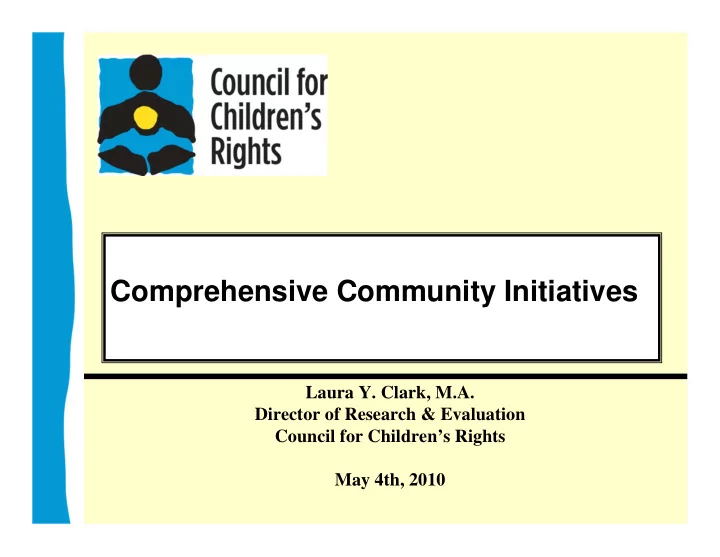

Comprehensive Community Initiatives Laura Y. Clark, M.A. Director of Research & Evaluation Council for Children’s Rights May 4th, 2010
Objectives • Pre-Meeting Survey Results • Brief history of CCIs • Elements of comprehensive community initiatives • Overview of prior initiatives in other communities • Share “lessons learned” from those initiatives
Today’s Participants: Survey Results • You represent a wide variety of agencies, government entities and neighborhood stakeholders • You have experience with community change and/or neighborhood projects • You have ideas about what works and what doesn’t work in community change efforts • You’re eager to hear from others and share your own experiences
Today’s Participants: Survey Results • 50% of you are involved with a neighborhood project • 89% want to learn about other initiatives in Charlotte • 86% want to hear about “lessons learned” from other comprehensive community change efforts • 75% of you want to connect with other people and organizations • 67% want to engage in collective visioning about a neighborhood initiative in Charlotte
Today’s Participants: Survey Results – Community Change Efforts Resident Engagement Neighborhood buy-in is critical for success. Community residents should be engaged from the beginning of an initiative and the needs of the residents should drive the planning process. To build trust, outside organizations need to spend time listening to the residents and build on community strengths.
Today’s Participants: Survey Results – Community Change Efforts Leadership There should be clear and diverse leadership that includes strong neighborhood leaders; projects should also include leadership development for neighborhood residents.
Today’s Participants: Survey Results – Community Change Efforts Goals & Accountability There should be clear, agreed-upon goals established in the beginning. The mechanisms for achieving the goals should be flexible enough to respond to initial outcomes and changing community dynamics. Accountability is central to success; clear deliverables should be identified and results should be measured
Today’s Participants: Survey Results – Community Change Efforts Comprehensive These initiatives should be comprehensive in nature and include a wide variety of community organizations and broad community representation. It’s important to identify and work on the causes of poverty and not just the symptoms.
Today’s Participants: Survey Results – Community Change Efforts Cultural Competence Cultural differences must be acknowledged and worked through in order to build trust and have a successful initiative; this takes time and commitment from all involved.
Today’s Participants: Survey Results – Community Change Efforts Financial Resources These types of initiatives require large initial and ongoing investments. You have to be very clear about how (and to who) the money flows and who has control of the resources from the beginning. Avoid “philanthropic paternalism” – funders don’t always know what is best and sometimes ignore research and identified neighborhood needs
History of CCIs • Began in the late 1980’s • Built on experiences of prior attempts at community change • By the beginning of the 21 st century, most major cities had a CCI
Prior Initiatives Reviewed • Rebuilding Communities Initiative • New Futures • Neighborhood Improvement Initiative • The Urban Health Initiative • Community Building in Partnership • Comprehensive Community Revitalization Program • The Aspen Institute - analysis of multiple initiatives
What is a CCI? • They have a beginning and an end • Explicitly comprehensive • A community based plan is developed with residents • There is a governance structure • Partner with multiple community agencies • Connect the neighborhood with external sources of power • Have an evaluation component
Who are the players in community change efforts? • Residents of the community • Ground-level actors - community groups and organizations that carry out day-to-day work • Support organizations - funders, technical assistance providers, research entities and intermediaries • Advocacy organizations - focus on public and private sector policy issues, advocacy and political change
Lessons Learned: Accomplishments • Strengthened neighborhood infrastructure • Increased programs and services for neighborhoods • Increased capacity of individuals and organizations • Increased resources for neighborhoods • Improved collaboration between agencies and neighborhoods
Lessons Learned: Challenges • Neighborhoods do not have the power to achieve significant change in spite of the rest of the world • Insufficient attention is paid to neighborhood capacity to implement a comprehensive agenda • Too often focused on treating the manifestations of poverty instead of the root causes • Too little attention paid to racial and ethnic differences • CCIs promised too much and were judged by unrealistic standards • Funding needs to be long-term and flexible • The results of CCIs are mixed and generally have not transformed neighborhoods
Lessons Learned: Sustainability • Set a clear vision including specific objectives • Be results oriented with measurable outcomes • Adapt to changing conditions • Have a broad base of community support • Identify key champions • Establish strong internal systems • Have a sustainability plan
Contact Information Visit our website for access to materials referenced today: www.cfcrights.org Laura Y. Clark, M.A. Brett Loftis, J.D. Director of Research & Executive Director Evaluation Council for Children’s Council for Children’s Rights Rights Laura@cfcrights.org Brett@cfcrights.org
Recommend
More recommend